Analyzing PepsiCo India: Performance, Ethics, and Social Impact
VerifiedAdded on 2023/04/23
|9
|2358
|219
Case Study
AI Summary
This case study delves into the ethical and strategic challenges faced by PepsiCo India, examining the company's obligations beyond profitability, including societal and ethical responsibilities. It analyzes the strategic tension between business performance and ethical considerations, exploring whether PepsiCo India can achieve a balance between profit motives and social responsibility. The study also investigates the conflicts between short-term financial objectives and long-term goals, such as natural resource management and employee welfare. Furthermore, it evaluates PepsiCo India's mission of 'Performance with a Purpose,' questioning whether it represents a genuine commitment or merely a public relations exercise. The analysis draws upon various strategic management and ethical frameworks to provide a comprehensive understanding of PepsiCo India's approach to balancing profitability with ethical and social concerns.
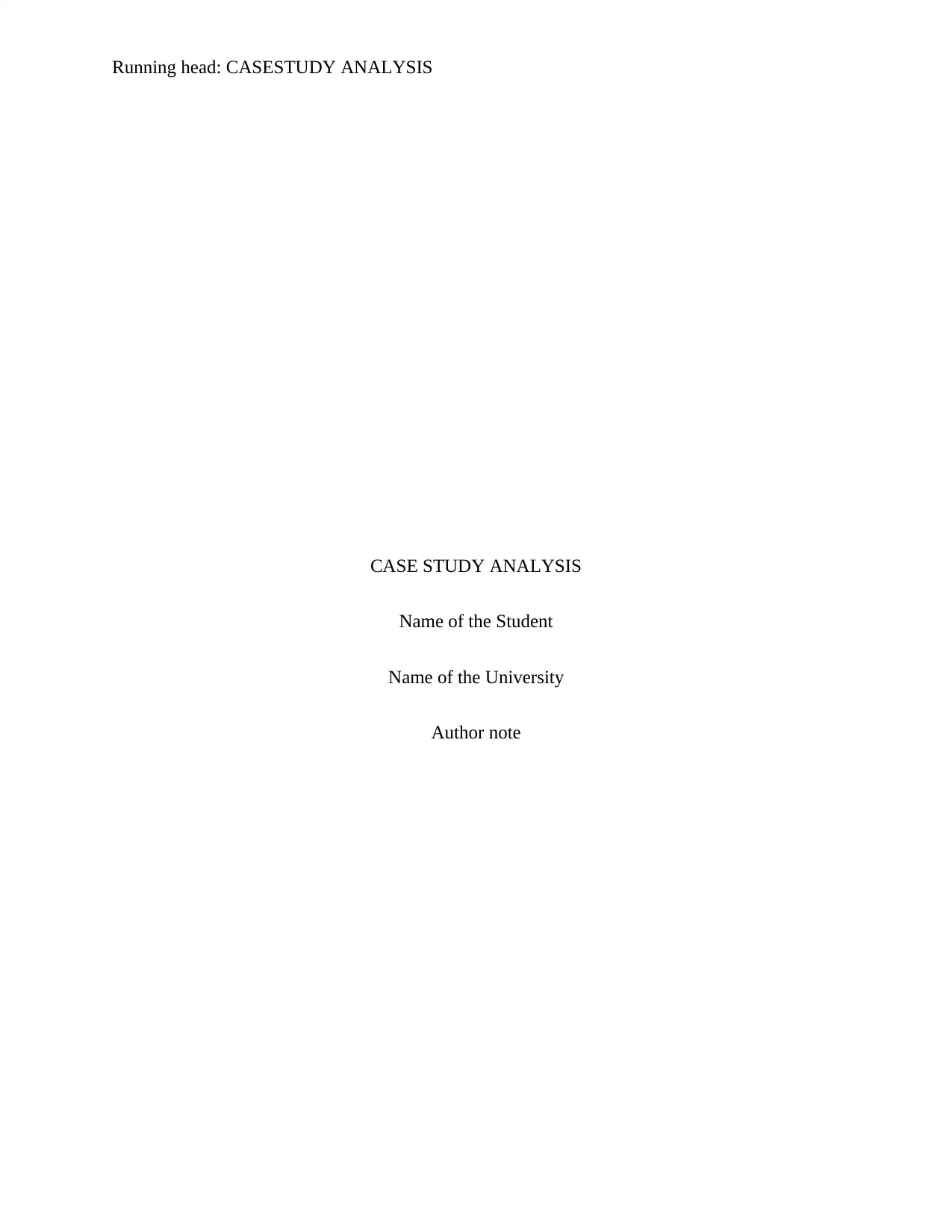
Running head: CASESTUDY ANALYSIS
CASE STUDY ANALYSIS
Name of the Student
Name of the University
Author note
CASE STUDY ANALYSIS
Name of the Student
Name of the University
Author note
Paraphrase This Document
Need a fresh take? Get an instant paraphrase of this document with our AI Paraphraser
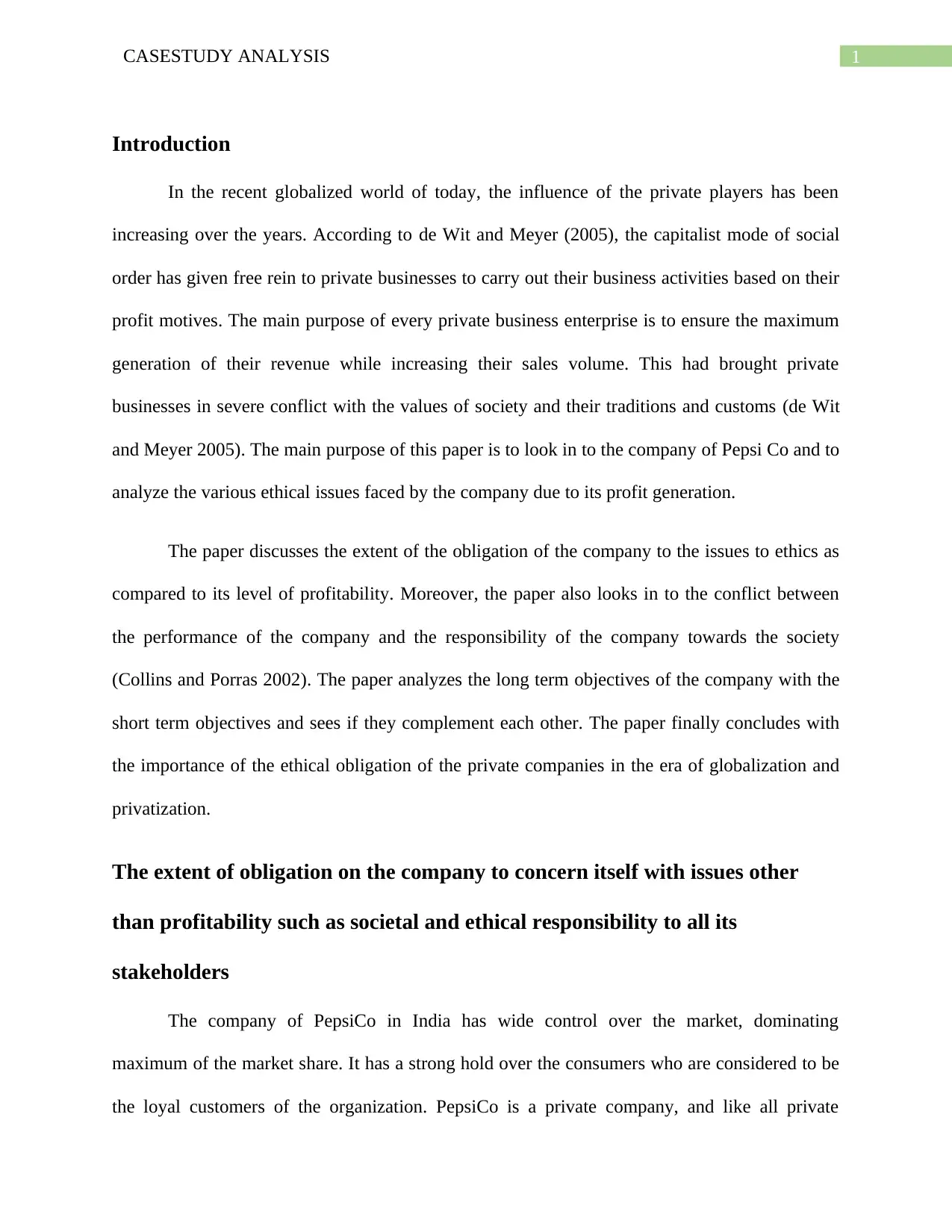
1CASESTUDY ANALYSIS
Introduction
In the recent globalized world of today, the influence of the private players has been
increasing over the years. According to de Wit and Meyer (2005), the capitalist mode of social
order has given free rein to private businesses to carry out their business activities based on their
profit motives. The main purpose of every private business enterprise is to ensure the maximum
generation of their revenue while increasing their sales volume. This had brought private
businesses in severe conflict with the values of society and their traditions and customs (de Wit
and Meyer 2005). The main purpose of this paper is to look in to the company of Pepsi Co and to
analyze the various ethical issues faced by the company due to its profit generation.
The paper discusses the extent of the obligation of the company to the issues to ethics as
compared to its level of profitability. Moreover, the paper also looks in to the conflict between
the performance of the company and the responsibility of the company towards the society
(Collins and Porras 2002). The paper analyzes the long term objectives of the company with the
short term objectives and sees if they complement each other. The paper finally concludes with
the importance of the ethical obligation of the private companies in the era of globalization and
privatization.
The extent of obligation on the company to concern itself with issues other
than profitability such as societal and ethical responsibility to all its
stakeholders
The company of PepsiCo in India has wide control over the market, dominating
maximum of the market share. It has a strong hold over the consumers who are considered to be
the loyal customers of the organization. PepsiCo is a private company, and like all private
Introduction
In the recent globalized world of today, the influence of the private players has been
increasing over the years. According to de Wit and Meyer (2005), the capitalist mode of social
order has given free rein to private businesses to carry out their business activities based on their
profit motives. The main purpose of every private business enterprise is to ensure the maximum
generation of their revenue while increasing their sales volume. This had brought private
businesses in severe conflict with the values of society and their traditions and customs (de Wit
and Meyer 2005). The main purpose of this paper is to look in to the company of Pepsi Co and to
analyze the various ethical issues faced by the company due to its profit generation.
The paper discusses the extent of the obligation of the company to the issues to ethics as
compared to its level of profitability. Moreover, the paper also looks in to the conflict between
the performance of the company and the responsibility of the company towards the society
(Collins and Porras 2002). The paper analyzes the long term objectives of the company with the
short term objectives and sees if they complement each other. The paper finally concludes with
the importance of the ethical obligation of the private companies in the era of globalization and
privatization.
The extent of obligation on the company to concern itself with issues other
than profitability such as societal and ethical responsibility to all its
stakeholders
The company of PepsiCo in India has wide control over the market, dominating
maximum of the market share. It has a strong hold over the consumers who are considered to be
the loyal customers of the organization. PepsiCo is a private company, and like all private
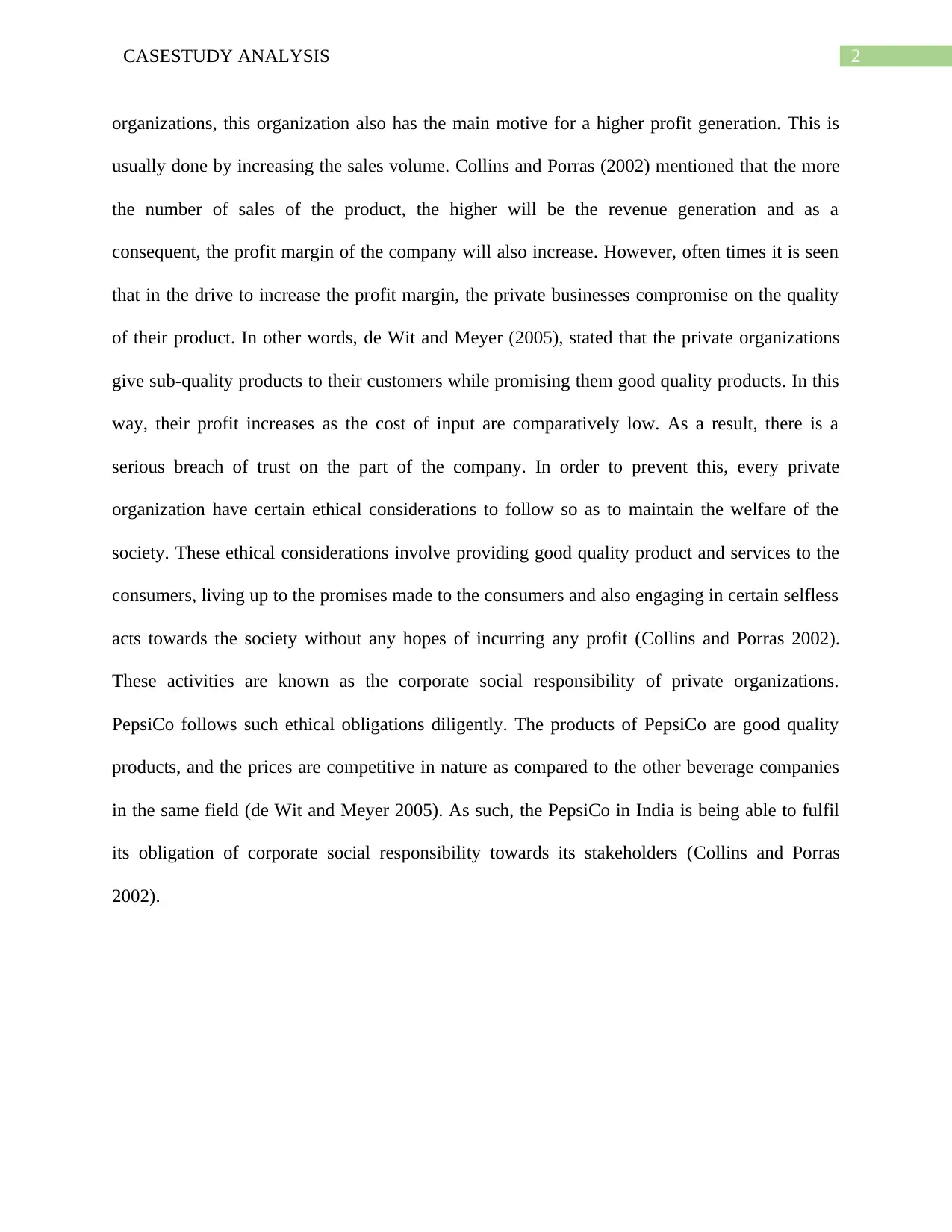
2CASESTUDY ANALYSIS
organizations, this organization also has the main motive for a higher profit generation. This is
usually done by increasing the sales volume. Collins and Porras (2002) mentioned that the more
the number of sales of the product, the higher will be the revenue generation and as a
consequent, the profit margin of the company will also increase. However, often times it is seen
that in the drive to increase the profit margin, the private businesses compromise on the quality
of their product. In other words, de Wit and Meyer (2005), stated that the private organizations
give sub-quality products to their customers while promising them good quality products. In this
way, their profit increases as the cost of input are comparatively low. As a result, there is a
serious breach of trust on the part of the company. In order to prevent this, every private
organization have certain ethical considerations to follow so as to maintain the welfare of the
society. These ethical considerations involve providing good quality product and services to the
consumers, living up to the promises made to the consumers and also engaging in certain selfless
acts towards the society without any hopes of incurring any profit (Collins and Porras 2002).
These activities are known as the corporate social responsibility of private organizations.
PepsiCo follows such ethical obligations diligently. The products of PepsiCo are good quality
products, and the prices are competitive in nature as compared to the other beverage companies
in the same field (de Wit and Meyer 2005). As such, the PepsiCo in India is being able to fulfil
its obligation of corporate social responsibility towards its stakeholders (Collins and Porras
2002).
organizations, this organization also has the main motive for a higher profit generation. This is
usually done by increasing the sales volume. Collins and Porras (2002) mentioned that the more
the number of sales of the product, the higher will be the revenue generation and as a
consequent, the profit margin of the company will also increase. However, often times it is seen
that in the drive to increase the profit margin, the private businesses compromise on the quality
of their product. In other words, de Wit and Meyer (2005), stated that the private organizations
give sub-quality products to their customers while promising them good quality products. In this
way, their profit increases as the cost of input are comparatively low. As a result, there is a
serious breach of trust on the part of the company. In order to prevent this, every private
organization have certain ethical considerations to follow so as to maintain the welfare of the
society. These ethical considerations involve providing good quality product and services to the
consumers, living up to the promises made to the consumers and also engaging in certain selfless
acts towards the society without any hopes of incurring any profit (Collins and Porras 2002).
These activities are known as the corporate social responsibility of private organizations.
PepsiCo follows such ethical obligations diligently. The products of PepsiCo are good quality
products, and the prices are competitive in nature as compared to the other beverage companies
in the same field (de Wit and Meyer 2005). As such, the PepsiCo in India is being able to fulfil
its obligation of corporate social responsibility towards its stakeholders (Collins and Porras
2002).
⊘ This is a preview!⊘
Do you want full access?
Subscribe today to unlock all pages.

Trusted by 1+ million students worldwide
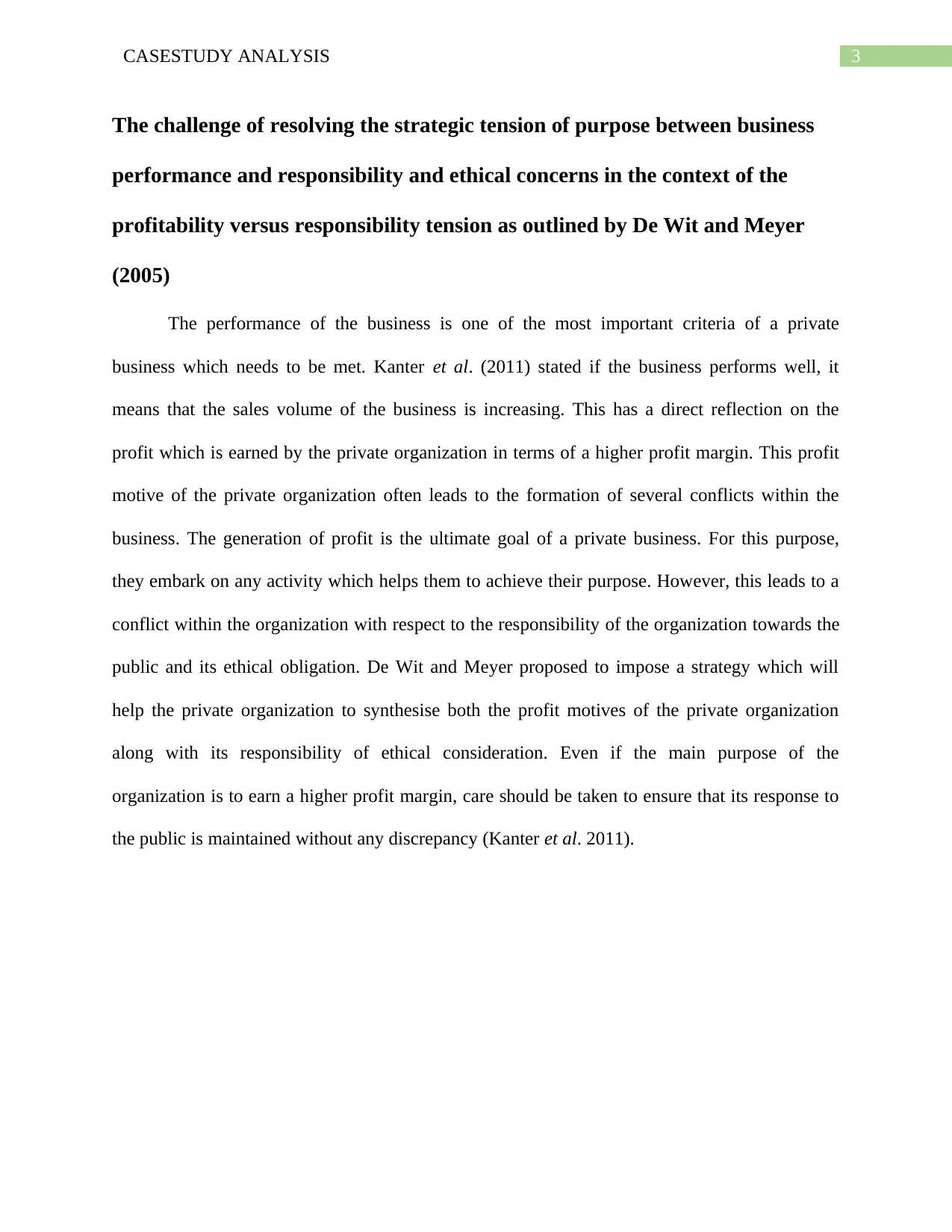
3CASESTUDY ANALYSIS
The challenge of resolving the strategic tension of purpose between business
performance and responsibility and ethical concerns in the context of the
profitability versus responsibility tension as outlined by De Wit and Meyer
(2005)
The performance of the business is one of the most important criteria of a private
business which needs to be met. Kanter et al. (2011) stated if the business performs well, it
means that the sales volume of the business is increasing. This has a direct reflection on the
profit which is earned by the private organization in terms of a higher profit margin. This profit
motive of the private organization often leads to the formation of several conflicts within the
business. The generation of profit is the ultimate goal of a private business. For this purpose,
they embark on any activity which helps them to achieve their purpose. However, this leads to a
conflict within the organization with respect to the responsibility of the organization towards the
public and its ethical obligation. De Wit and Meyer proposed to impose a strategy which will
help the private organization to synthesise both the profit motives of the private organization
along with its responsibility of ethical consideration. Even if the main purpose of the
organization is to earn a higher profit margin, care should be taken to ensure that its response to
the public is maintained without any discrepancy (Kanter et al. 2011).
The challenge of resolving the strategic tension of purpose between business
performance and responsibility and ethical concerns in the context of the
profitability versus responsibility tension as outlined by De Wit and Meyer
(2005)
The performance of the business is one of the most important criteria of a private
business which needs to be met. Kanter et al. (2011) stated if the business performs well, it
means that the sales volume of the business is increasing. This has a direct reflection on the
profit which is earned by the private organization in terms of a higher profit margin. This profit
motive of the private organization often leads to the formation of several conflicts within the
business. The generation of profit is the ultimate goal of a private business. For this purpose,
they embark on any activity which helps them to achieve their purpose. However, this leads to a
conflict within the organization with respect to the responsibility of the organization towards the
public and its ethical obligation. De Wit and Meyer proposed to impose a strategy which will
help the private organization to synthesise both the profit motives of the private organization
along with its responsibility of ethical consideration. Even if the main purpose of the
organization is to earn a higher profit margin, care should be taken to ensure that its response to
the public is maintained without any discrepancy (Kanter et al. 2011).
Paraphrase This Document
Need a fresh take? Get an instant paraphrase of this document with our AI Paraphraser
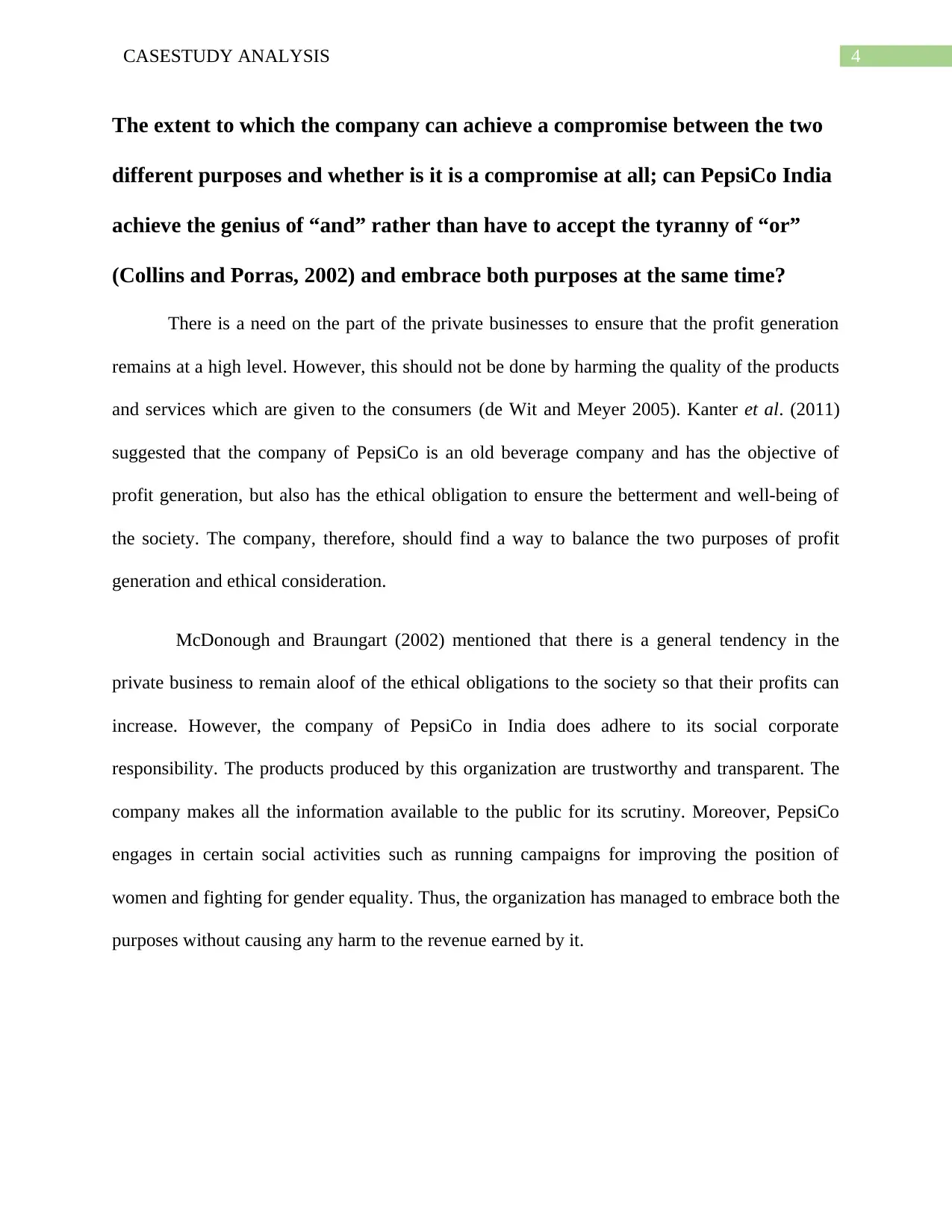
4CASESTUDY ANALYSIS
The extent to which the company can achieve a compromise between the two
different purposes and whether is it is a compromise at all; can PepsiCo India
achieve the genius of “and” rather than have to accept the tyranny of “or”
(Collins and Porras, 2002) and embrace both purposes at the same time?
There is a need on the part of the private businesses to ensure that the profit generation
remains at a high level. However, this should not be done by harming the quality of the products
and services which are given to the consumers (de Wit and Meyer 2005). Kanter et al. (2011)
suggested that the company of PepsiCo is an old beverage company and has the objective of
profit generation, but also has the ethical obligation to ensure the betterment and well-being of
the society. The company, therefore, should find a way to balance the two purposes of profit
generation and ethical consideration.
McDonough and Braungart (2002) mentioned that there is a general tendency in the
private business to remain aloof of the ethical obligations to the society so that their profits can
increase. However, the company of PepsiCo in India does adhere to its social corporate
responsibility. The products produced by this organization are trustworthy and transparent. The
company makes all the information available to the public for its scrutiny. Moreover, PepsiCo
engages in certain social activities such as running campaigns for improving the position of
women and fighting for gender equality. Thus, the organization has managed to embrace both the
purposes without causing any harm to the revenue earned by it.
The extent to which the company can achieve a compromise between the two
different purposes and whether is it is a compromise at all; can PepsiCo India
achieve the genius of “and” rather than have to accept the tyranny of “or”
(Collins and Porras, 2002) and embrace both purposes at the same time?
There is a need on the part of the private businesses to ensure that the profit generation
remains at a high level. However, this should not be done by harming the quality of the products
and services which are given to the consumers (de Wit and Meyer 2005). Kanter et al. (2011)
suggested that the company of PepsiCo is an old beverage company and has the objective of
profit generation, but also has the ethical obligation to ensure the betterment and well-being of
the society. The company, therefore, should find a way to balance the two purposes of profit
generation and ethical consideration.
McDonough and Braungart (2002) mentioned that there is a general tendency in the
private business to remain aloof of the ethical obligations to the society so that their profits can
increase. However, the company of PepsiCo in India does adhere to its social corporate
responsibility. The products produced by this organization are trustworthy and transparent. The
company makes all the information available to the public for its scrutiny. Moreover, PepsiCo
engages in certain social activities such as running campaigns for improving the position of
women and fighting for gender equality. Thus, the organization has managed to embrace both the
purposes without causing any harm to the revenue earned by it.
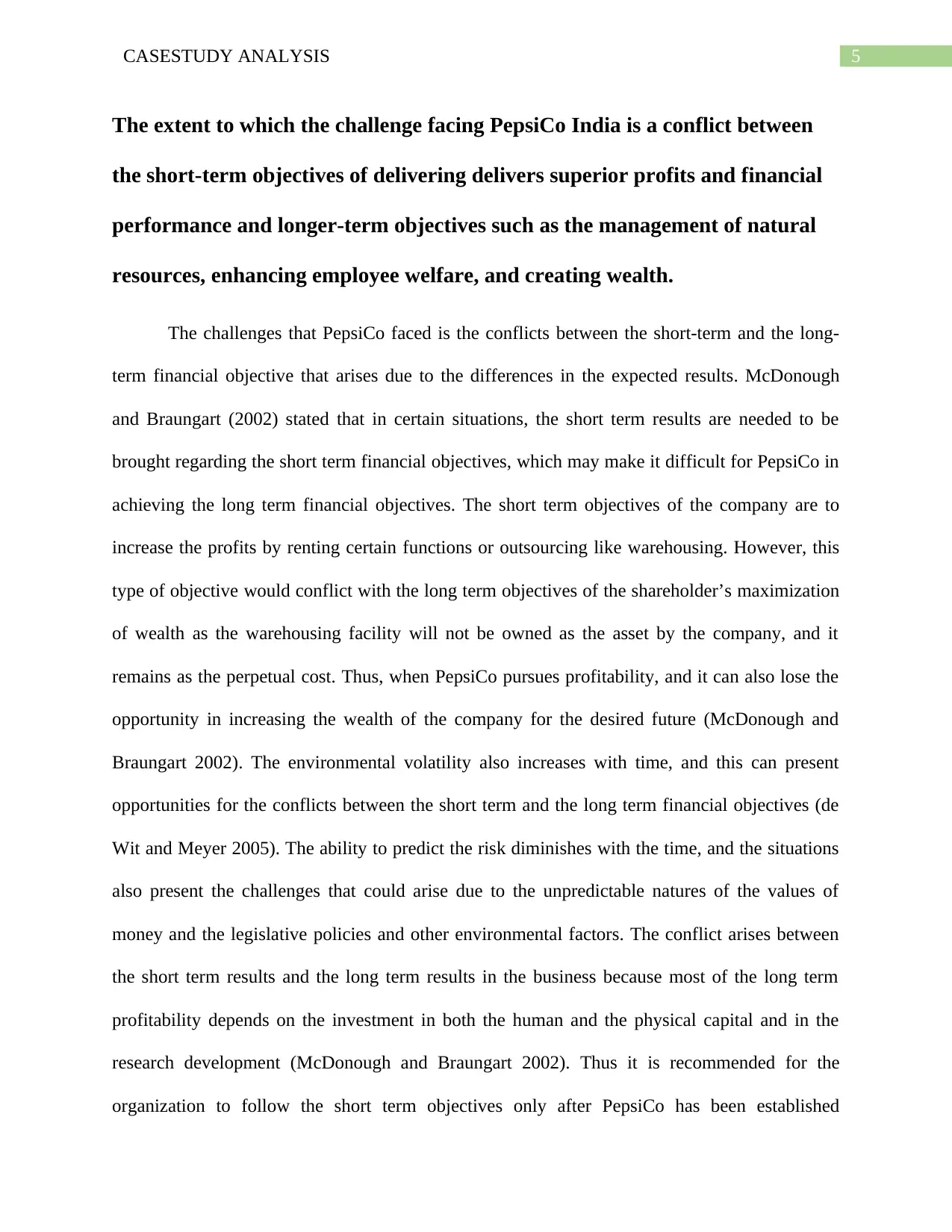
5CASESTUDY ANALYSIS
The extent to which the challenge facing PepsiCo India is a conflict between
the short-term objectives of delivering delivers superior profits and financial
performance and longer-term objectives such as the management of natural
resources, enhancing employee welfare, and creating wealth.
The challenges that PepsiCo faced is the conflicts between the short-term and the long-
term financial objective that arises due to the differences in the expected results. McDonough
and Braungart (2002) stated that in certain situations, the short term results are needed to be
brought regarding the short term financial objectives, which may make it difficult for PepsiCo in
achieving the long term financial objectives. The short term objectives of the company are to
increase the profits by renting certain functions or outsourcing like warehousing. However, this
type of objective would conflict with the long term objectives of the shareholder’s maximization
of wealth as the warehousing facility will not be owned as the asset by the company, and it
remains as the perpetual cost. Thus, when PepsiCo pursues profitability, and it can also lose the
opportunity in increasing the wealth of the company for the desired future (McDonough and
Braungart 2002). The environmental volatility also increases with time, and this can present
opportunities for the conflicts between the short term and the long term financial objectives (de
Wit and Meyer 2005). The ability to predict the risk diminishes with the time, and the situations
also present the challenges that could arise due to the unpredictable natures of the values of
money and the legislative policies and other environmental factors. The conflict arises between
the short term results and the long term results in the business because most of the long term
profitability depends on the investment in both the human and the physical capital and in the
research development (McDonough and Braungart 2002). Thus it is recommended for the
organization to follow the short term objectives only after PepsiCo has been established
The extent to which the challenge facing PepsiCo India is a conflict between
the short-term objectives of delivering delivers superior profits and financial
performance and longer-term objectives such as the management of natural
resources, enhancing employee welfare, and creating wealth.
The challenges that PepsiCo faced is the conflicts between the short-term and the long-
term financial objective that arises due to the differences in the expected results. McDonough
and Braungart (2002) stated that in certain situations, the short term results are needed to be
brought regarding the short term financial objectives, which may make it difficult for PepsiCo in
achieving the long term financial objectives. The short term objectives of the company are to
increase the profits by renting certain functions or outsourcing like warehousing. However, this
type of objective would conflict with the long term objectives of the shareholder’s maximization
of wealth as the warehousing facility will not be owned as the asset by the company, and it
remains as the perpetual cost. Thus, when PepsiCo pursues profitability, and it can also lose the
opportunity in increasing the wealth of the company for the desired future (McDonough and
Braungart 2002). The environmental volatility also increases with time, and this can present
opportunities for the conflicts between the short term and the long term financial objectives (de
Wit and Meyer 2005). The ability to predict the risk diminishes with the time, and the situations
also present the challenges that could arise due to the unpredictable natures of the values of
money and the legislative policies and other environmental factors. The conflict arises between
the short term results and the long term results in the business because most of the long term
profitability depends on the investment in both the human and the physical capital and in the
research development (McDonough and Braungart 2002). Thus it is recommended for the
organization to follow the short term objectives only after PepsiCo has been established
⊘ This is a preview!⊘
Do you want full access?
Subscribe today to unlock all pages.

Trusted by 1+ million students worldwide
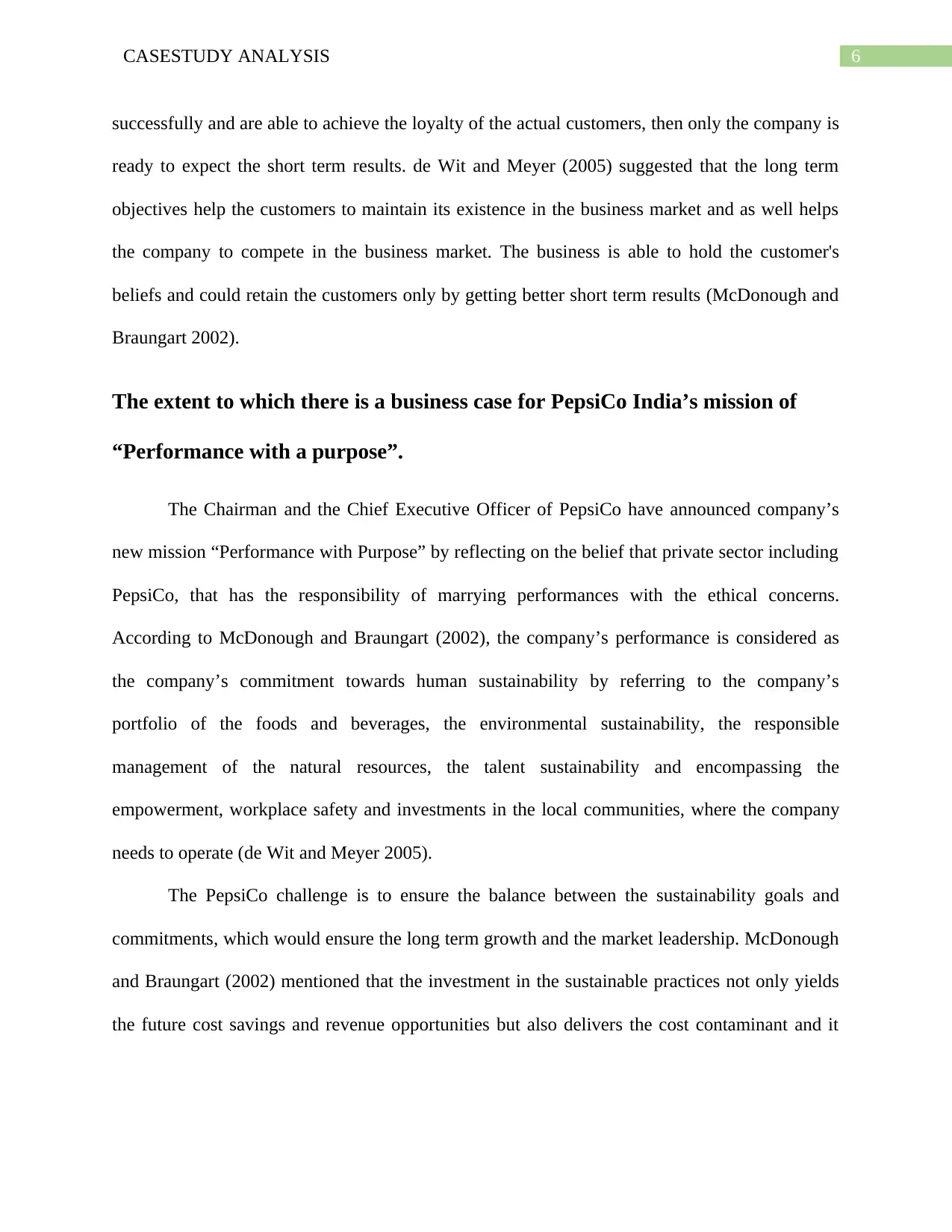
6CASESTUDY ANALYSIS
successfully and are able to achieve the loyalty of the actual customers, then only the company is
ready to expect the short term results. de Wit and Meyer (2005) suggested that the long term
objectives help the customers to maintain its existence in the business market and as well helps
the company to compete in the business market. The business is able to hold the customer's
beliefs and could retain the customers only by getting better short term results (McDonough and
Braungart 2002).
The extent to which there is a business case for PepsiCo India’s mission of
“Performance with a purpose”.
The Chairman and the Chief Executive Officer of PepsiCo have announced company’s
new mission “Performance with Purpose” by reflecting on the belief that private sector including
PepsiCo, that has the responsibility of marrying performances with the ethical concerns.
According to McDonough and Braungart (2002), the company’s performance is considered as
the company’s commitment towards human sustainability by referring to the company’s
portfolio of the foods and beverages, the environmental sustainability, the responsible
management of the natural resources, the talent sustainability and encompassing the
empowerment, workplace safety and investments in the local communities, where the company
needs to operate (de Wit and Meyer 2005).
The PepsiCo challenge is to ensure the balance between the sustainability goals and
commitments, which would ensure the long term growth and the market leadership. McDonough
and Braungart (2002) mentioned that the investment in the sustainable practices not only yields
the future cost savings and revenue opportunities but also delivers the cost contaminant and it
successfully and are able to achieve the loyalty of the actual customers, then only the company is
ready to expect the short term results. de Wit and Meyer (2005) suggested that the long term
objectives help the customers to maintain its existence in the business market and as well helps
the company to compete in the business market. The business is able to hold the customer's
beliefs and could retain the customers only by getting better short term results (McDonough and
Braungart 2002).
The extent to which there is a business case for PepsiCo India’s mission of
“Performance with a purpose”.
The Chairman and the Chief Executive Officer of PepsiCo have announced company’s
new mission “Performance with Purpose” by reflecting on the belief that private sector including
PepsiCo, that has the responsibility of marrying performances with the ethical concerns.
According to McDonough and Braungart (2002), the company’s performance is considered as
the company’s commitment towards human sustainability by referring to the company’s
portfolio of the foods and beverages, the environmental sustainability, the responsible
management of the natural resources, the talent sustainability and encompassing the
empowerment, workplace safety and investments in the local communities, where the company
needs to operate (de Wit and Meyer 2005).
The PepsiCo challenge is to ensure the balance between the sustainability goals and
commitments, which would ensure the long term growth and the market leadership. McDonough
and Braungart (2002) mentioned that the investment in the sustainable practices not only yields
the future cost savings and revenue opportunities but also delivers the cost contaminant and it
Paraphrase This Document
Need a fresh take? Get an instant paraphrase of this document with our AI Paraphraser
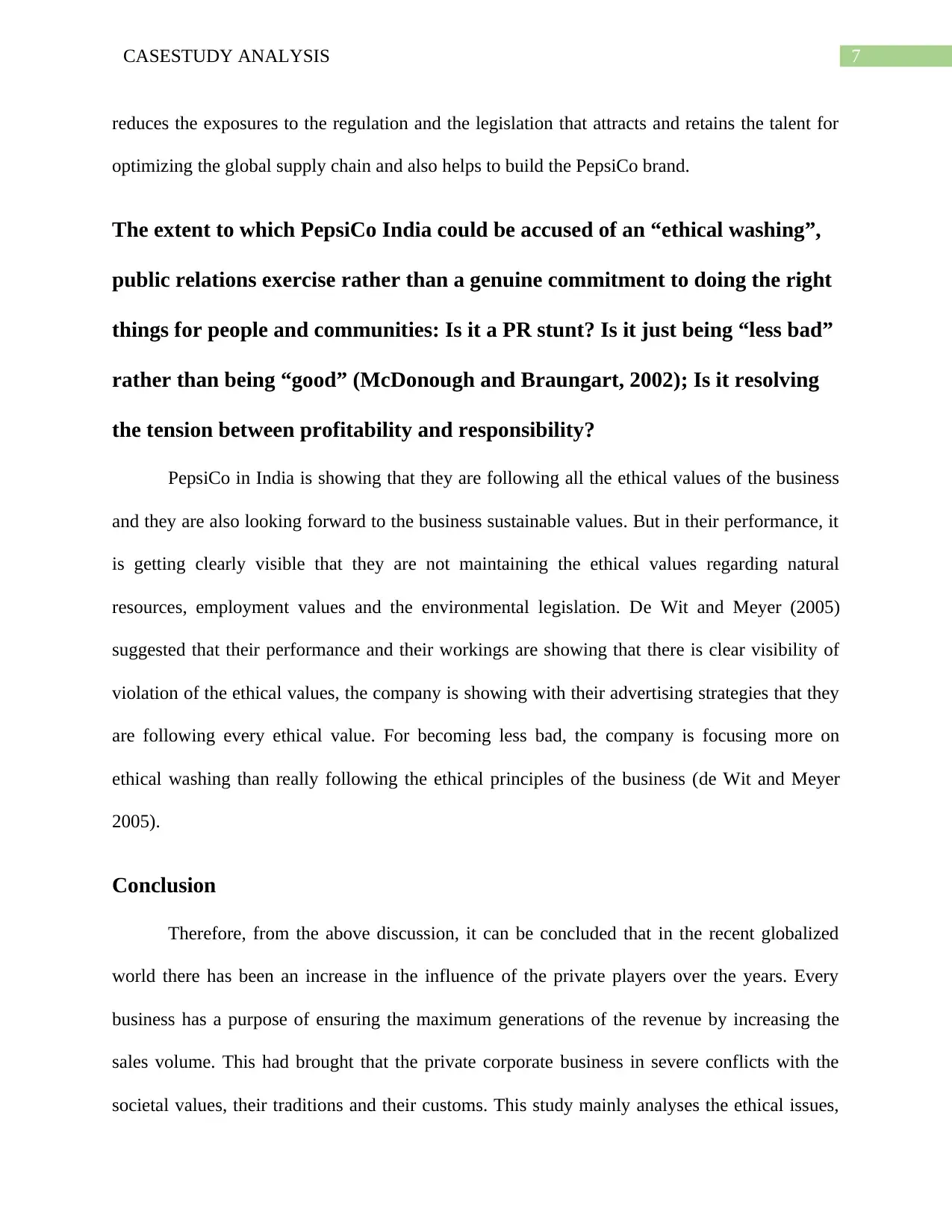
7CASESTUDY ANALYSIS
reduces the exposures to the regulation and the legislation that attracts and retains the talent for
optimizing the global supply chain and also helps to build the PepsiCo brand.
The extent to which PepsiCo India could be accused of an “ethical washing”,
public relations exercise rather than a genuine commitment to doing the right
things for people and communities: Is it a PR stunt? Is it just being “less bad”
rather than being “good” (McDonough and Braungart, 2002); Is it resolving
the tension between profitability and responsibility?
PepsiCo in India is showing that they are following all the ethical values of the business
and they are also looking forward to the business sustainable values. But in their performance, it
is getting clearly visible that they are not maintaining the ethical values regarding natural
resources, employment values and the environmental legislation. De Wit and Meyer (2005)
suggested that their performance and their workings are showing that there is clear visibility of
violation of the ethical values, the company is showing with their advertising strategies that they
are following every ethical value. For becoming less bad, the company is focusing more on
ethical washing than really following the ethical principles of the business (de Wit and Meyer
2005).
Conclusion
Therefore, from the above discussion, it can be concluded that in the recent globalized
world there has been an increase in the influence of the private players over the years. Every
business has a purpose of ensuring the maximum generations of the revenue by increasing the
sales volume. This had brought that the private corporate business in severe conflicts with the
societal values, their traditions and their customs. This study mainly analyses the ethical issues,
reduces the exposures to the regulation and the legislation that attracts and retains the talent for
optimizing the global supply chain and also helps to build the PepsiCo brand.
The extent to which PepsiCo India could be accused of an “ethical washing”,
public relations exercise rather than a genuine commitment to doing the right
things for people and communities: Is it a PR stunt? Is it just being “less bad”
rather than being “good” (McDonough and Braungart, 2002); Is it resolving
the tension between profitability and responsibility?
PepsiCo in India is showing that they are following all the ethical values of the business
and they are also looking forward to the business sustainable values. But in their performance, it
is getting clearly visible that they are not maintaining the ethical values regarding natural
resources, employment values and the environmental legislation. De Wit and Meyer (2005)
suggested that their performance and their workings are showing that there is clear visibility of
violation of the ethical values, the company is showing with their advertising strategies that they
are following every ethical value. For becoming less bad, the company is focusing more on
ethical washing than really following the ethical principles of the business (de Wit and Meyer
2005).
Conclusion
Therefore, from the above discussion, it can be concluded that in the recent globalized
world there has been an increase in the influence of the private players over the years. Every
business has a purpose of ensuring the maximum generations of the revenue by increasing the
sales volume. This had brought that the private corporate business in severe conflicts with the
societal values, their traditions and their customs. This study mainly analyses the ethical issues,
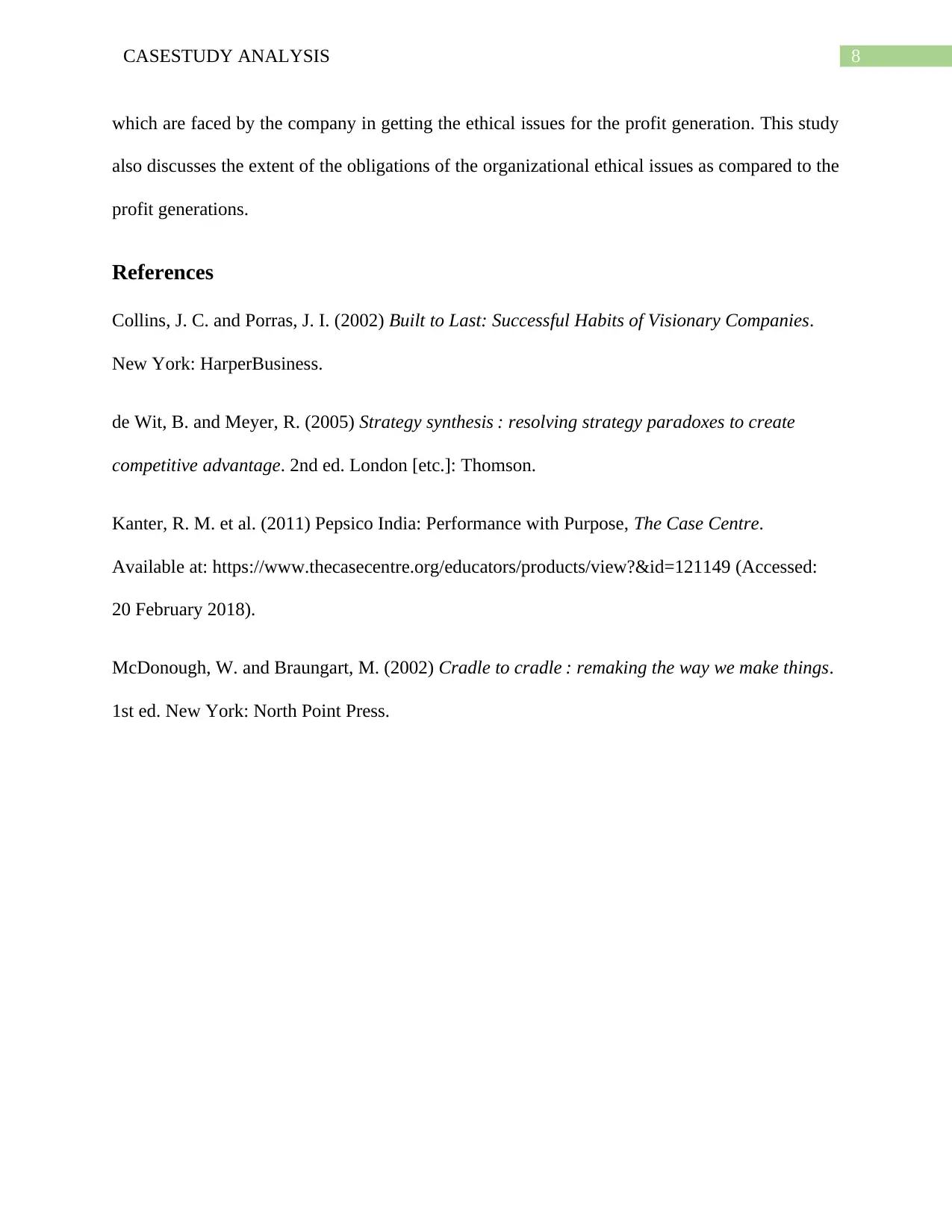
8CASESTUDY ANALYSIS
which are faced by the company in getting the ethical issues for the profit generation. This study
also discusses the extent of the obligations of the organizational ethical issues as compared to the
profit generations.
References
Collins, J. C. and Porras, J. I. (2002) Built to Last: Successful Habits of Visionary Companies.
New York: HarperBusiness.
de Wit, B. and Meyer, R. (2005) Strategy synthesis : resolving strategy paradoxes to create
competitive advantage. 2nd ed. London [etc.]: Thomson.
Kanter, R. M. et al. (2011) Pepsico India: Performance with Purpose, The Case Centre.
Available at: https://www.thecasecentre.org/educators/products/view?&id=121149 (Accessed:
20 February 2018).
McDonough, W. and Braungart, M. (2002) Cradle to cradle : remaking the way we make things.
1st ed. New York: North Point Press.
which are faced by the company in getting the ethical issues for the profit generation. This study
also discusses the extent of the obligations of the organizational ethical issues as compared to the
profit generations.
References
Collins, J. C. and Porras, J. I. (2002) Built to Last: Successful Habits of Visionary Companies.
New York: HarperBusiness.
de Wit, B. and Meyer, R. (2005) Strategy synthesis : resolving strategy paradoxes to create
competitive advantage. 2nd ed. London [etc.]: Thomson.
Kanter, R. M. et al. (2011) Pepsico India: Performance with Purpose, The Case Centre.
Available at: https://www.thecasecentre.org/educators/products/view?&id=121149 (Accessed:
20 February 2018).
McDonough, W. and Braungart, M. (2002) Cradle to cradle : remaking the way we make things.
1st ed. New York: North Point Press.
⊘ This is a preview!⊘
Do you want full access?
Subscribe today to unlock all pages.

Trusted by 1+ million students worldwide
1 out of 9
Your All-in-One AI-Powered Toolkit for Academic Success.
+13062052269
info@desklib.com
Available 24*7 on WhatsApp / Email
![[object Object]](/_next/static/media/star-bottom.7253800d.svg)
Unlock your academic potential
Copyright © 2020–2026 A2Z Services. All Rights Reserved. Developed and managed by ZUCOL.

